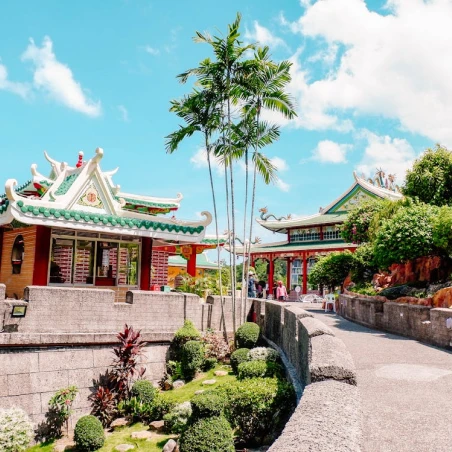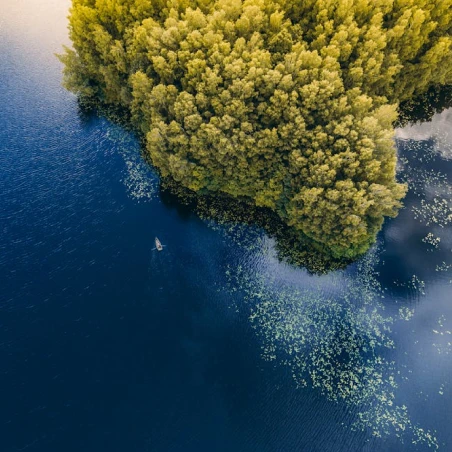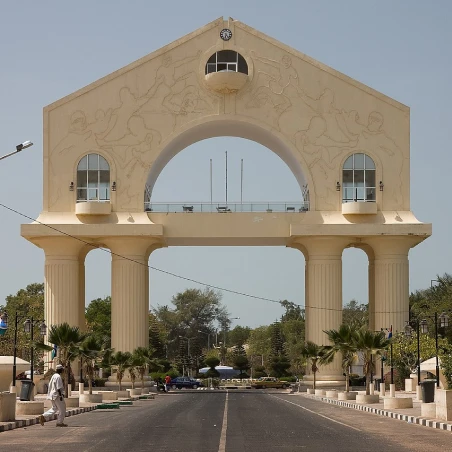Table of Contents:
- How much does a vacation to New Zealand cost?
- What is a daily budget for a budget traveler?
- What is a daily budget for a mid-range traveler?
- What is a daily budget for a luxury traveler?
- How does the travel season affect your trip cost?
- What is the cost of flights to New Zealand?
- How much does accommodation cost in New Zealand?
- What are the costs for hostels and budget lodging?
- What are the costs for mid-range hotels and motels?
- What are the transportation costs within New Zealand?
- How much does renting a car or campervan cost?
- What is the cost of public transport and ferries?
- How much should you budget for food and drink?
- What is the cost of activities in New Zealand?
- How can you stay connected with an eSIM in New Zealand?
- What other expenses should you plan for?
- How can you save money on your New Zealand trip?
How much does a vacation to New Zealand cost?
A trip to New Zealand is moderately expensive, but the total cost depends heavily on your travel style and trip length. Your main expenses are flights, accommodation, transportation, food, and activities. On average, travel cost data shows a traveler spends about $154 USD (NZ$269) per day. However, budget-conscious travelers can lower this significantly, with daily costs ranging from NZ$57 to NZ$90. Meanwhile, mid-range travelers' expenses often start around NZ$250, while luxury travelers can easily spend over NZ$775 per day.
A one-week trip for two people averages around $2,156 (NZ$3,766). A longer three-week trip for two could cost about $6,468 (NZ$11,300). While these numbers provide a baseline, where you fall on this spectrum depends entirely on your choices—and, let's be honest, a few smart strategies can bring your costs down significantly.
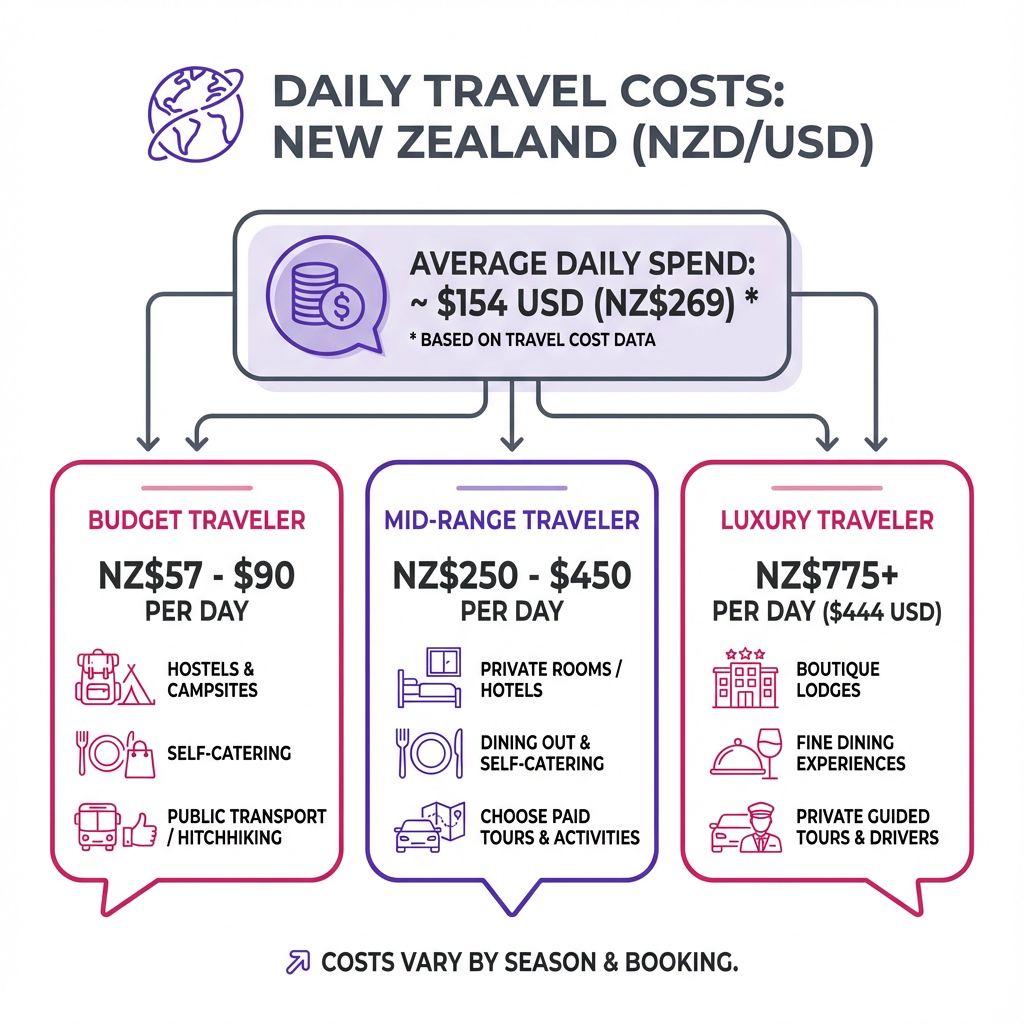
What is a daily budget for a budget traveler?
Budget travelers can expect to spend about NZ$57 to NZ$90 per person each day. This means staying in budget accommodation like hostels or campsites and self-catering most meals. To save money, you'll rely on public transport or even hitchhiking. This approach means prioritizing free activities like hiking, but it requires a trade-off in comfort and convenience.
What is a daily budget for a mid-range traveler?
A mid-range traveler in New Zealand typically budgets between NZ$250 and NZ$450 per person daily. This budget supports comfortable accommodation, such as private hotel rooms, and a mix of dining out and self-catering. It also allows for a wider variety of paid activities and tours. A two-week trip for mid-range travel in New Zealand can cost between NZ$3,500 and NZ$6,300.
What is a daily budget for a luxury traveler?
A luxury travel budget in New Zealand starts around $444 (NZ$775) per person, with no real upper limit depending on the level of exclusivity, which opens the door to boutique lodges, private guided tours, and fine dining experiences. You can enjoy luxury hotels, fine dining, and private drivers. It also allows for exclusive excursions and premium activities, all about comfort and one-of-a-kind experiences. A two-week luxury trip can easily cost NZ$7,000 or more.
How does the travel season affect your trip cost?
The time of year you choose to visit has a major impact on your budget:
- Peak Season (Dec-Feb): This is the most expensive time for flights and accommodation, so be sure to book 3-6 months in advance.
- Shoulder Seasons (Mar-May & Sep-Nov): These months offer a good balance of pleasant weather and lower costs.
- Off-Peak Season (Jun-Aug): This is the cheapest time to travel, except for ski towns like Queenstown.
What is the cost of flights to New Zealand?
International flights are often the biggest single expense for a New Zealand trip. Travelers from North America can expect fares to range from $1,250 to $2,100 USD, while flights from Europe typically cost between $780 and $1,750 USD. Prices fluctuate by season, with May often being the cheapest month to fly, while December and August are the most expensive.
To find the best deals on flights, keep a few tips in mind:
- Book at least six weeks in advance.
- Use flight comparison sites with flexible date features.
- Choose flights with layovers instead of direct routes.
- Use airline loyalty programs.
How much does accommodation cost in New Zealand?
Accommodation costs average $164 NZD per night, but this can vary widely depending on the type you choose:
- Budget: Hostels ($20-$80/night) and campsites are widely available.
- Mid-Range: Motels and hotels typically range from $100-$200/night.
- Luxury: Premium hotels and lodges start at $300/night.
You'll see this difference in hotel rates, where an average room might cost NZ$180 ($104 USD) in the low season but rise to NZ$335 ($194 USD) during peak times. From my own experience, this is no exaggeration, so book in advance to secure the best rates, especially in popular areas.
What are the costs for hostels and budget lodging?
Hostels and budget lodging are the most economical choices, costing $20 to $80 USD per night. Hostels offer backpackers dorm-style beds with shared kitchens and common areas, though many also provide private rooms for a higher price. If you've got a self-contained vehicle, Department of Conservation (DOC) campsites are a cheap alternative at around $13 USD per night. You can also camp for free in designated 'freedom camping' areas. Travelers can also find budget options through Couchsurfing or hostel work exchange programs.
What are the costs for mid-range hotels and motels?
Mid-range travelers can find comfortable 3-4 star hotels and motels for NZ$100 to NZ$200 per night (approximately $60-$120 USD). Expect to pay around $139 (NZ$242) for an average double-occupancy room. These options usually include private rooms, en-suite bathrooms, and sometimes kitchenettes for more comfort and privacy.
What are the transportation costs within New Zealand?
For many visitors, a self-drive road trip is the classic way to experience New Zealand’s landscapes. Car rentals average about NZ$62 per day, plus fuel costs of roughly NZ$15 per 100 km. A campervan offers combined transport and lodging but at a higher rental price.
For a more budget-friendly option, stick to public transport. Daily expenses average about $22 (NZ$39) per person. The InterCity bus network covers most long-distance travel routes. Traveling between the North and South Islands requires a ferry trip across the Cook Strait. A return journey with a campervan costs around NZ$413. Domestic flights are the fastest way to cover long distances. They're also more expensive, with prices from $50 to $200 USD per person.
How much does renting a car or campervan cost?
For a standard car, you can expect rental costs to be around NZ$62 per day, but this doesn't include fuel or insurance. Campervan rentals start around $105 USD daily, with prices rising sharply in peak season. Factor in fuel as a significant part of your rental budget, with prices around NZ$2.50 per liter. Your budget should also account for insurance, one-way hire fees, and a mandatory Road User Charge (RUC) for diesel vehicles.
What is the cost of public transport and ferries?
Using public transport is an economical way to get around. For long journeys, the InterCity bus system offers the most common and affordable option. To save money, you can purchase a bus pass like the InterCity FlexiPass for discounted travel hours.
You'll need to take the Cook Strait ferry to cross between the islands. A return trip on the Cook Strait ferry with a campervan costs about NZ$413, and passenger fares are a separate charge. In cities, local transport uses prepaid cards, contributing to the average daily cost of about $22 (NZ$39) per person.
How much should you budget for food and drink?
Expect food to be a significant daily expense, averaging around $49 (NZ$86) per person, largely because dining out in New Zealand can be quite pricey. A typical breakfast can run you $15-$25 USD, while lunch costs between $20-$40 USD. For a restaurant dinner, expect to pay $30-$50 USD.
Shopping at supermarkets like Pak'nSave can dramatically reduce food costs. Trust me on this one; it's the single best way to manage your daily budget. Keep in mind that beverages will add to your grocery bill, with a typical bottle of local wine costing around NZ$19-20.
What is the cost of activities in New Zealand?
A typical daily budget for activities averages between NZ$32 and NZ$58 per person. Many popular experiences are paid, and the costs can add up quickly. Adventure sports are a prime example, with bungy jumping costing around NZ$255 and skydiving costs about NZ$320. Other popular activities include Hobbiton Movie Set tours (from NZ$89) and experiences like jet boating or cruises in Milford Sound.
However, you can balance these costs with many free activities. The country's natural beauty offers endless free sightseeing. You can hike in national parks, visit stunning beaches, and explore thermal springs. To save money, look for deals on discount websites for tours and attractions.
How can you stay connected with an eSIM in New Zealand?
To avoid high international roaming fees, here's a pro-tip I swear by: consider getting an eSIM—a digital SIM card you can activate on your phone before you even land. This gives you immediate data access without the hassle of finding a local store to buy a physical SIM card.
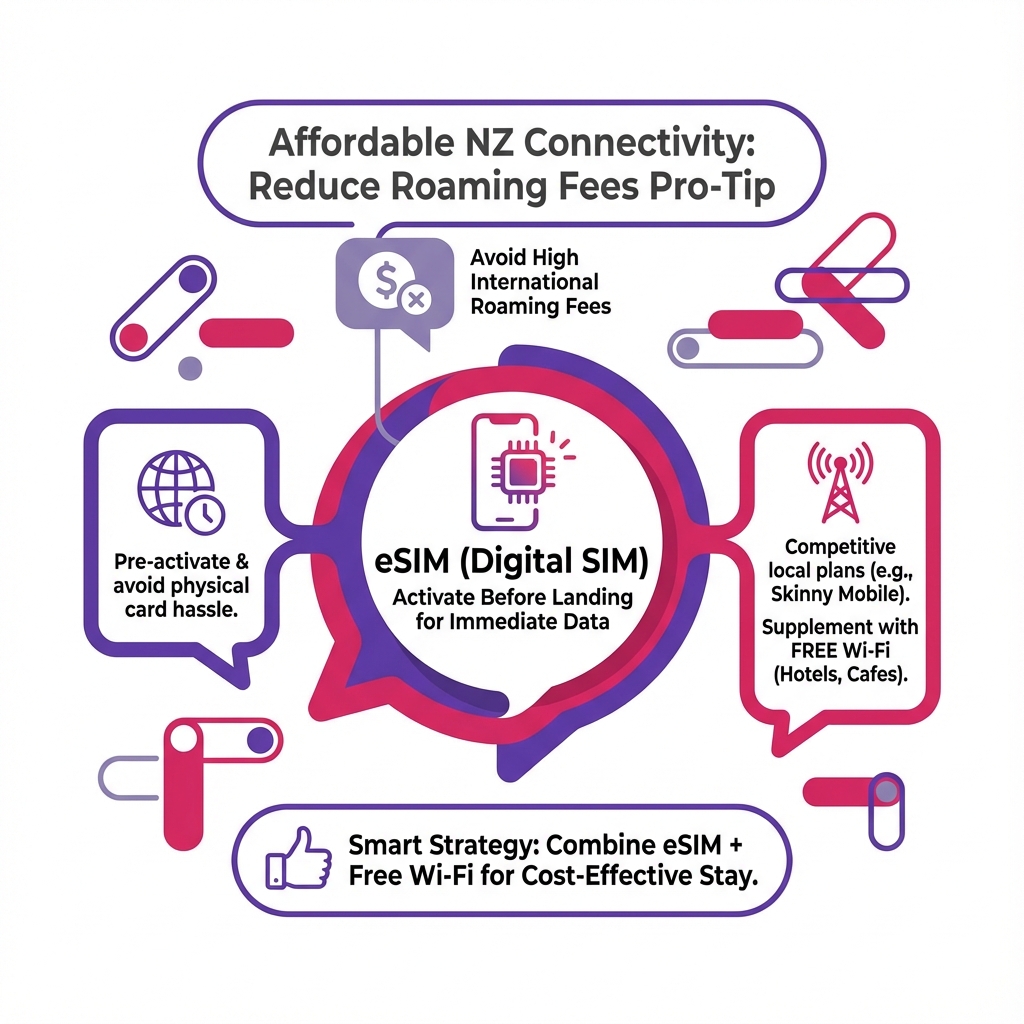
For reliable connectivity, consider a dedicated eSIM for New Zealand to select a data plan that fits your travel duration. Many providers, including local companies like Skinny Mobile, offer competitive plans for both physical and eSIM cards. You can supplement your mobile data with the free Wi-Fi that's available in most hotels, cafes, and public spaces.
What other expenses should you plan for?
Many international visitors must pay for a visa and the International Visitor Conservation and Tourism Levy (IVL). Travel insurance is also critical, as it protects you from unexpected costs like medical emergencies or trip cancellations. On average, travelers report spending around NZ$112 per person for the entire trip on souvenirs and gifts, but this is highly personal. It’s also wise to set aside a contingency fund—typically 10-15% of your total budget—to cover any unexpected costs or emergencies.
How can you save money on your New Zealand trip?
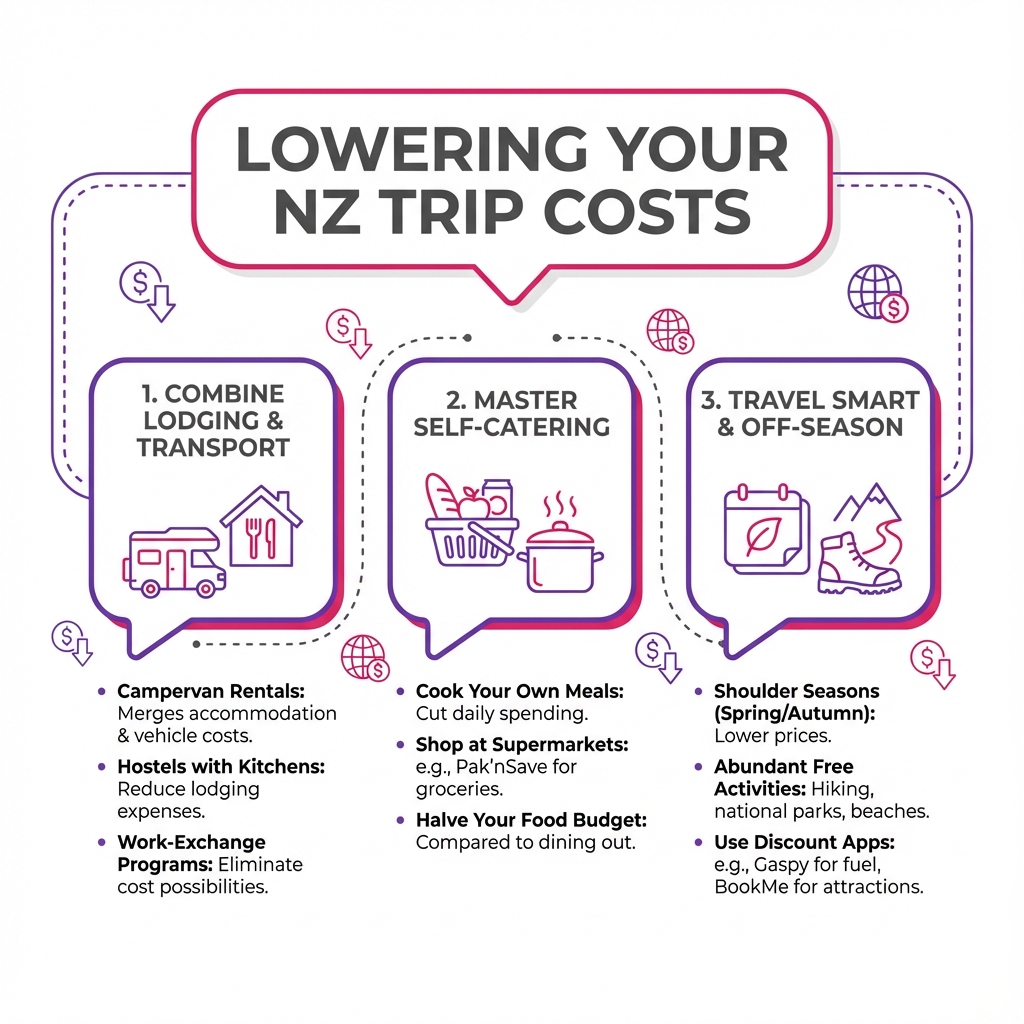
Adopting a few key strategies can dramatically lower your overall costs. Focus on these top three areas:
- Combine Your Lodging and Transport. Renting a campervan is a classic Kiwi strategy that merges your accommodation and vehicle costs into one. Alternatively, stay in hostels with kitchens or look into work-exchange programs to significantly reduce or even eliminate lodging expenses.
- Master the Art of Self-Catering. Cooking for yourself is the single most effective way to cut down on daily spending. Shopping at supermarkets like Pak'nSave for groceries can easily cut your food budget in half compared to dining out for every meal.
- Travel Smart: Off-Season and Free Fun. Travel during the shoulder seasons (spring/autumn) to take advantage of lower prices on flights, accommodation, and rentals. Fill your itinerary with New Zealand's abundant free activities, like hiking in national parks and visiting stunning beaches. For paid attractions, seek out discounts on sites like BookMe, and use apps like Gaspy to find the cheapest fuel.
Sources
Posts you might also like


